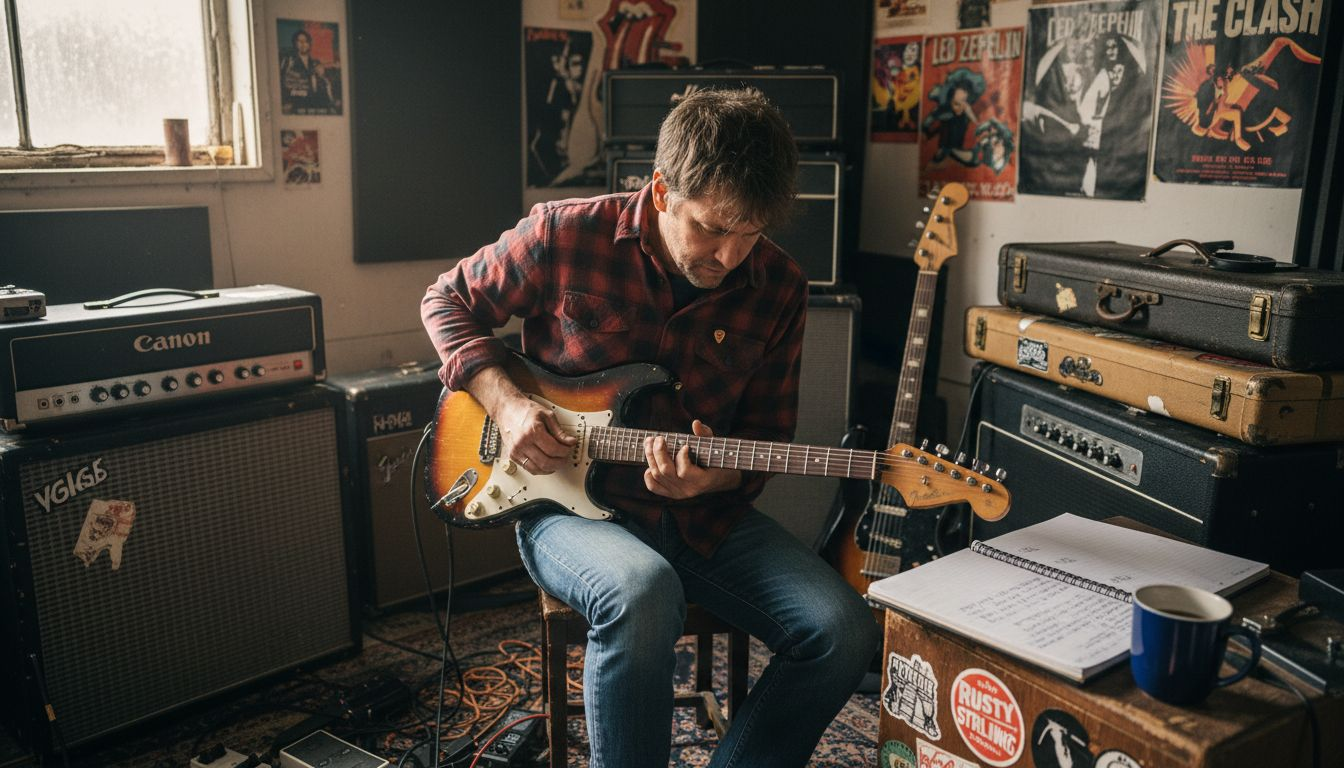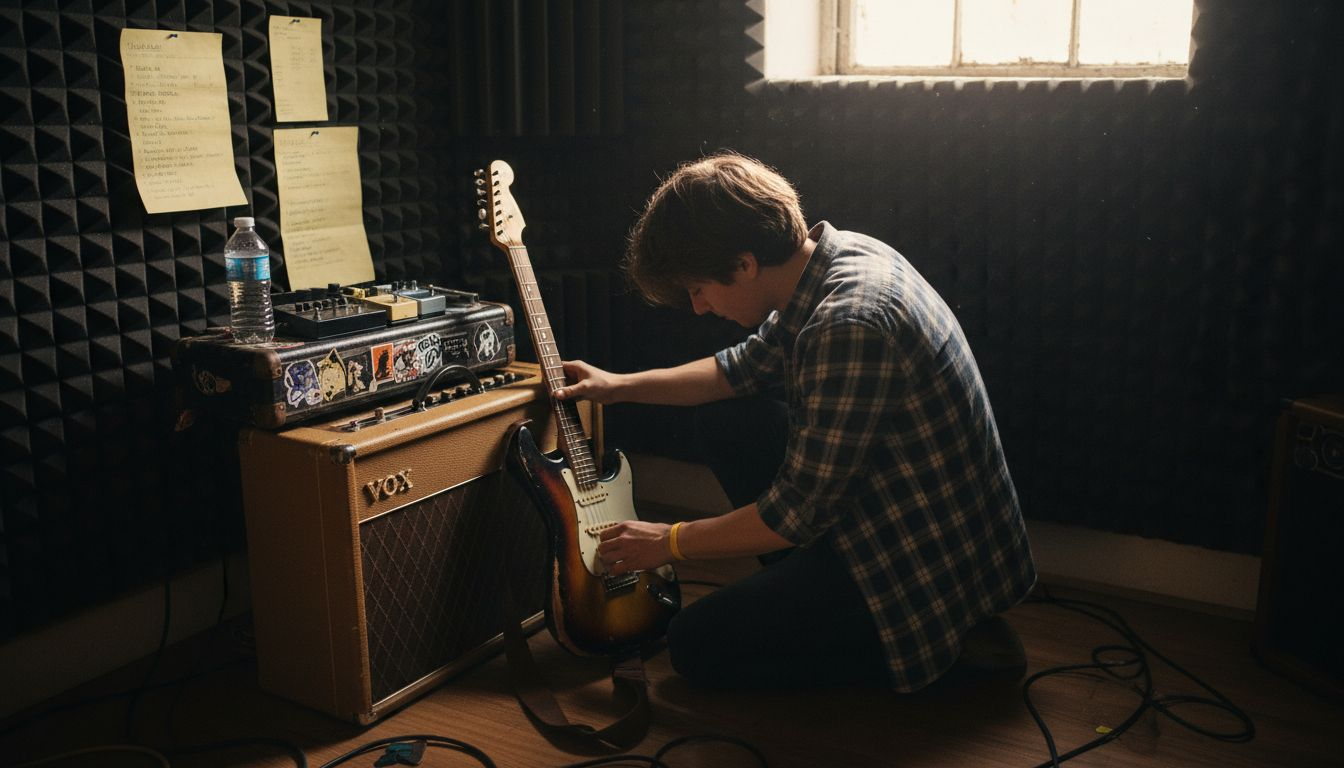Are you eager to improve your guitar skills and take your playing to the next level? Whether you’re just starting out or looking to refine your technique, this blog is packed with guitar tips and practical advice to help you master the guitar.
From essential tips for new guitar players to advanced strategies for experienced musicians, we cover everything you need to know to enhance your playing.
Explore expert guitar playing tips that will sharpen your skills, boost your confidence, and make you a more versatile guitarist.
5 Expert Tips to Master Your Guitar Skills
Tip 1: Practice, Practice, Practice
It may seem like an obvious tip, but the importance of practice cannot be overstated. Whether you're a beginner or an experienced player, regular practice is essential for improving your skills and building your confidence. Make sure you set aside time each day to practice your guitar, even if it's just for a few minutes. As the saying goes, practice makes perfect!
Tip 2: Learn from the Best
One of the best ways to improve your guitar skills is to learn from the best. Seek out lessons from experienced players or watch online tutorials from session musicians. By learning from those who have already achieved success in the industry, you can pick up invaluable tips and tricks that will help you to improve your playing and take your skills to the next level.
Tip 3: Experiment with Your Sound
If you're looking to stand out as a guitarist, it's essential to experiment with your sound. Don't be afraid to try new techniques or play with different effects pedals to create a unique sound that's all your own. You can also tinker with your acoustic guitar setup, trying out different strings, picks, and even adjusting the action or intonation. By experimenting with your sound, you'll not only stand out from other guitarists, but you'll also improve your overall playing skills.
Tip 4: Focus on Your Timing
Timing is everything when it comes to guitar playing. Whether you're playing rhythm or lead guitar, it's essential to focus on your timing to ensure that your playing is tight and consistent. Practice playing along to a metronome or drum track to improve your timing skills and build your confidence as a player.
Tip 5: Jam with Other Musicians
Playing with other musicians is a great way to improve your guitar skills and develop your musical style. Seek out opportunities to jam with other musicians, whether it's at an open mic night or a jam session at a local music venue. By playing with other musicians, you'll not only improve your playing skills but you'll also gain valuable experience working with other artists and learning how to collaborate effectively.
Develop a Practice Routine That Works for You
Find Your Optimal Practice Time
Understanding when you are most focused and productive can significantly impact your practice quality. Some people find that they learn best in the morning, while others prefer late-night sessions. Experiment with different times of day to find when you feel most engaged.
Break Down Practice Sessions
Instead of long, unstructured practice sessions, break your time into focused intervals. Spend 10 minutes on scales, 15 minutes on a difficult piece, and another 10 minutes on improvisation. This targeted approach prevents burnout and keeps you motivated.
Build Finger Strength and Dexterity
Practice Finger Exercises
Finger exercises, like chromatic scales and spider exercises, can help improve dexterity and strength. Dedicate a few minutes each day to these exercises to build muscle memory and finger independence.
Use a Grip Strengthener
Consider using a grip strengthener to enhance your finger strength. Stronger fingers provide better control and endurance, especially for techniques like string bending and vibrato.
Master Different Guitar Techniques
Learn Alternate Picking and Economy Picking
Alternate picking involves striking the strings with up and down motions, while economy picking focuses on the most efficient motion between strings. Practice these techniques separately and gradually increase your speed and accuracy.
Experiment with Fingerpicking
Fingerpicking allows for more dynamic expression and is essential for genres like folk, blues, and classical. Practice basic patterns and slowly introduce more complex pieces to develop finger independence and coordination.
Improve Your Music Theory Knowledge
Understand Scales and Modes
Learning scales and modes is crucial for improvisation and soloing. Start with the major and minor scales, then move on to modes like Dorian and Mixolydian to add new colors to your playing.
Learn Chord Progressions
Understanding common chord progressions helps you recognize patterns in songs and allows you to compose your music more effectively. Practice different progressions in various keys and learn to transpose them across the fretboard.
Enhance Your Ear Training Skills
Practice Interval Recognition
Train your ears by learning to recognize intervals between notes. Start with simple intervals like major and minor thirds, and gradually move to more complex ones. This skill will help you play by ear and improve your improvisation.
Transcribe Music by Ear
Pick a song you enjoy and try to transcribe it by ear. Start with simple melodies and progress to more complex solos. This exercise sharpens your listening skills and helps you understand phrasing and note choices used by other guitarists.
Set Clear Goals and Track Your Progress
Define Short-Term and Long-Term Goals
Set specific, measurable goals for your practice sessions, such as learning a new song, mastering a particular technique, or playing at a certain speed. Break these down into smaller tasks to stay focused and motivated.
Keep a Practice Journal
A practice journal can help you track your progress and identify areas for improvement. Write down what you worked on, what went well, and what needs more attention. Reviewing your journal regularly helps keep you on track.
Accept the Use of Technology
Utilize Guitar Apps and Software
There are many apps available for guitarists that provide virtual tuners, metronomes, backing tracks, and chord libraries. These tools can enhance your practice and make learning more interactive.
Record Your Playing
Recording yourself while practicing or performing can provide valuable feedback. Listen back to identify areas of improvement, such as timing, phrasing, or dynamics, and use these insights to refine your playing.
Learn to Care for Your Guitar
Regular Maintenance
Regularly clean and restring your guitar, check for any signs of wear and tear, and ensure that your instrument is always in optimal playing condition. A well-maintained guitar not only plays better but also inspires you to practice more.
Proper Storage
Store your guitar in a case or stand, away from extreme temperatures and humidity, to prevent damage. Keeping your instrument in good condition will ensure it remains reliable and responsive.
Conclusion
Mastering your guitar skills takes time and dedication, but with the right tips and techniques, it's possible to take your playing to the next level. Whether you're a beginner or an experienced player, make sure you're focusing on practice, learning from the best, experimenting with your sound, focusing on your timing, and jamming with other musicians. By incorporating these expert tips into your guitar playing routine, you'll be well on your way to becoming a top-notch session player in no time.
At Musicstreet, we're passionate about helping guitarists of all levels to improve their skills and achieve their musical goals.
As a family-run music shop in Cambridgeshire, we are your trusted independent guitar specialists, offering a wide range of electric and acoustic guitars, bass guitars, amplifiers, effect pedals, and other instruments and accessories to suit all your musical needs.
Whether you're looking for a new guitar, need help with an acoustic guitar setup, or just want to chat with fellow musicians, we're here to help. So why wait? Visit us today and discover the Musicstreet difference for yourself!
Frequently Asked Questions
Why do my fingers hurt when I practice for a long time?
If your fingers hurt, it's often due to pressing too hard or playing for too long without breaks. To avoid pain, try shorter practice sessions, use lighter strings, or adjust your guitar's action to make it easier to play.
What should I do if my guitar starts sounding dull?
If your guitar sounds dull, the strings might be old or dirty. Clean your strings regularly and replace them every few months or sooner if you play a lot. Also, check if the guitar's intonation needs adjustment for a brighter sound.
How can I improve my timing when playing with others?
To improve your timing, practice with a metronome or backing tracks. Start slow and gradually increase your speed. Playing with a drummer or in a group can also help you develop a strong sense of rhythm.
What do I do if I struggle to keep up with faster songs?
If you find it hard to play fast songs, start by practicing slowly and gradually increase your speed. Focus on accuracy rather than speed at first. Finger exercises and scales can also help build the speed you need.
Why does my guitar keep going out of tune?
Guitars can go out of tune due to changes in temperature or humidity, or if the tuning pegs are loose. Make sure your strings are properly wound and the tuning pegs are tight. Regular tuning checks and a setup can help maintain stable tuning.
How do I know which pick is right for me?
The right pick depends on your playing style. Thinner picks are great for strumming, while thicker picks offer more control for solos and lead playing. Try different picks to see which feels most comfortable and matches your style.
What should I do if my fingers feel stiff or slow?
Stiff or slow fingers can result from tension or lack of warm-up. Always start your practice with finger stretches and simple exercises to warm up. Take breaks and shake out your hands to avoid tension and keep your fingers agile.




Share:
7 Icons Who Swear by the Guitars of Rock 'n Roll Relics
The Humble Beginnings of the Legendary Collings Guitars